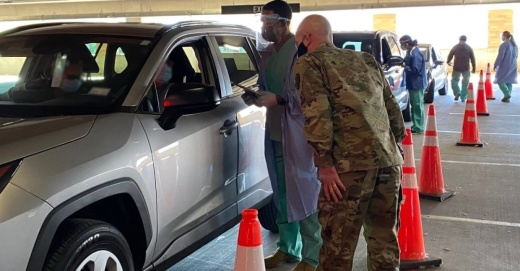San Antonio Metropolitan Health District on Jan. 3 upgraded its COVID-19 community risk level to “severe” with local officials basing their decision on multiple alarming trends, including a rising number of hospitalizations.
According to Metro Health, the local positivity rate is 27.3% with the highly contagious omicron variant accounting for 90%-100% of cases in Bexar County.
Metro Health on Jan. 3 reported 3,894 new cases of COVID-19 and two deaths. There are 506 patients in local hospitals, 22 of whom are pediatric patients, public health authorities said.
The resurgence of coronavirus has prompted businesses, school systems, banks and other organizations to temporarily close some public services. Trinity University is delaying restarting in-person classes until Jan. 31, and St. Mary's University is waiting until Jan. 24 to open the campus.
Bank of America encouraged workers in all branches nationwide to work from home if possible at least during the first week of January, according to a company announcement.
San Antonio Mayor Ron Nirenberg encouraged residents to take a blend of precautions, regardless of vaccination status.
“Our community is undergoing a surge of COVID-19 cases due to the fast-spreading omicron variant, and we all need to continue take precautions to protect ourselves and our loved ones,” Nirenberg said in a statement. “While the case numbers are surging, the data indicate that vaccines are preventing severe illness. Vaccines remain the best defense against any variant of COVID-19. Get vaccinated, wear a mask and stay home if you are sick.”
On Dec. 31, city and county leaders joined University Health officials to announce that local hospitals were entering a critical situation with the influx of patients.
“We have asked for 400 nurses and will be asking for more. People need to help us avoid filling up our hospitals by taking precautions such as masking up, sanitation and avoiding gatherings,” Bexar County Judge Nelson Wolff said.
Metro Health said the San Antonio area has enough testing capacity, but the city has requested expanded capacity at the state’s testing sites. The city has also authorized more testing sites to be set up over the coming days. Free community testing sites are listed at http://covid19.sanantonio.gov.
“The COVID-19 risk levels are there to inform our decisions as a community, but remember that we have the tools we need to protect ourselves and our loved ones from this virus,” Metro Health Director Claude Jacob said. “Getting vaccinated is your best protection from severe infection and potential hospitalization. Please continue to wear a mask, regardless of your vaccination status and encourage others to get vaccinated or obtain their booster when eligible.”
While the city has requested more testing sites, the state of Texas has asked for more federally supported testing locations and medical personnel as well as additional federal allocations of monoclonal antibody treatments.
“Testing sites, additional medical staff and continued shipments of therapeutics from the federal government will help us continue to save lives and mitigate the spread of COVID-19,” Gov. Greg Abbott said in a Dec. 31 statement.
Metro Health also stresses the importance of testing and what to do when getting tested. Authorities say people who have not received their test results and were exposed to a confirmed positive case of COVID-19 should stay home.
A positive self-test result means the infected person should avoid indoor gatherings.
A negative self-test result means a person may not have an infection, but repeating the test within 24 hours of the last test will raise the confidence in not being infected.
Additionally, Metro Health recommends precautions anytime residents are near people they do not live with:
- Wear a mask when not eating or drinking.
- Wash your hands often with soap and water for 20 seconds.
- Stay 6 feet apart from others.
- Consider if those around you may be higher risk of severe illness from COVID-19, such as older adults or those with certain medical conditions, and take extra precautions.





